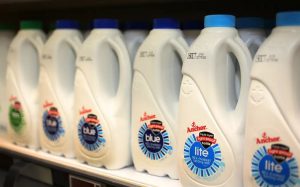
Dairy farmers across Ontario are facing thousands of dollars in losses after a massive winter storm that shut down roads starting Dec. 23, preventing drivers from picking up milk and forcing farmers to drain their supply.
Dairy Farmers of Ontario (DFO), which represents the province’s 3,300 licensed dairy producers, issued a statement on Dec. 24, notifying farmers of dangerous road conditions and asking them to dispose of milk that wouldn’t be able to be picked up by drivers.
“A cow produces milk whether it’s stormy, whether it’s sunny. She is always producing milk, and that milk has to go somewhere,” said Andrew Campbell, a Strathroy, Ont., farmer who lost roughly 5,000 litres of uninsured milk on Saturday, worth about $4,000.
The dairy industry is tightly regulated in Ontario. All fresh milk is sold to DFO, which then handles transportation, processing, pasteurization, and distribution.
Refrigerated trucks come to farms to pick up milk every 48 hours, which is why farms usually only have storage space for slightly more than 48 hours’ worth of product, Campbell said.
With the snow in the way of the supply chain’s operation, farmers had no other choice but to drain what they had to make room for the milk their cows were continuing to produce.
Farmers from as far north as Thunder Bay, Ont., took to social media platforms on Christmas Eve to showcase what the process of disposing of thousands of litres of milk looks like. Posts to Twitter showed rooms full of cow’s milk going down drains, straight from the tanks that are typically used to store and transfer the milk into trucks.
Rob Vanden Hengel woke up early Saturday to clear snow from his farm’s driveway for the expected milk truck. By 12:30 p.m., he heard from another dairy farmer that DFO was advising producers to dump their product if their truck hadn’t arrived.
“We’re like, well, that sucks. There’s probably a few other words that came out that I can’t really say on the radio,” said Vanden Hengel, whose dairy farm is just north of Seaforth, Ont., in Huron County, where all roads were closed during the storm.
Vanden Hengel lost roughly 3,400 litres or close to $3,000 in milk. However, he is insured.
“I’ve been milking cows since 2005 and it’s the first time that I’ve had to do that,” he said.
Bernie Kamphof is another one of the farmers feeling the impact of the storm. He has a 400-head operation, including 250 dairy cattle near Thunder Bay.
The storm’s impact on driving conditions in northern Ontario was not as pronounced as in southern Ontario, Kamphof said, but still, his pickup day was delayed due to a truck being stuck behind a closed road that was hundreds of kilometres away from his farm.
Kamphof didn’t just have to drain milk over the Christmas weekend but also on Tuesday. That resulted in a loss of 24,000 litres of milk, worth almost $20,000.
He says his farm hasn’t dumped milk since his family first bought it in 1953.
“It was something that was unprecedented for this farm,” said Kamphof. “We as farmers are producing a food product. I think I can speak for every farmer when we say we’re proud of the fact that we’re feeding people, and to have to dispose of our product is not a good feeling.”
A statement sent by DFO to CBC News says some isolated areas are still experiencing delays, despite most routes in the province being operational. While dairy farmers without insurance are looking at thousands of dollars in losses, the statement says DFO is looking at compensation for farmers.
“While it is good business practice to carry insurance, the DFO Board will be looking at the issue of compensation in the coming weeks,” the statement read.
Kamphof hopes for the industry to come together to cover losses.
“If you go through insurance, you’re going to pay in increased premiums if you make claims on your insurance. We’re big enough to basically self-insure for risks like this. I think it’s something that we need to look at seriously and consider as an option,” he said.
Meanwhile, DFO says consumers are unlikely to see any effects of the past few days of turbulence at the grocery store.
























